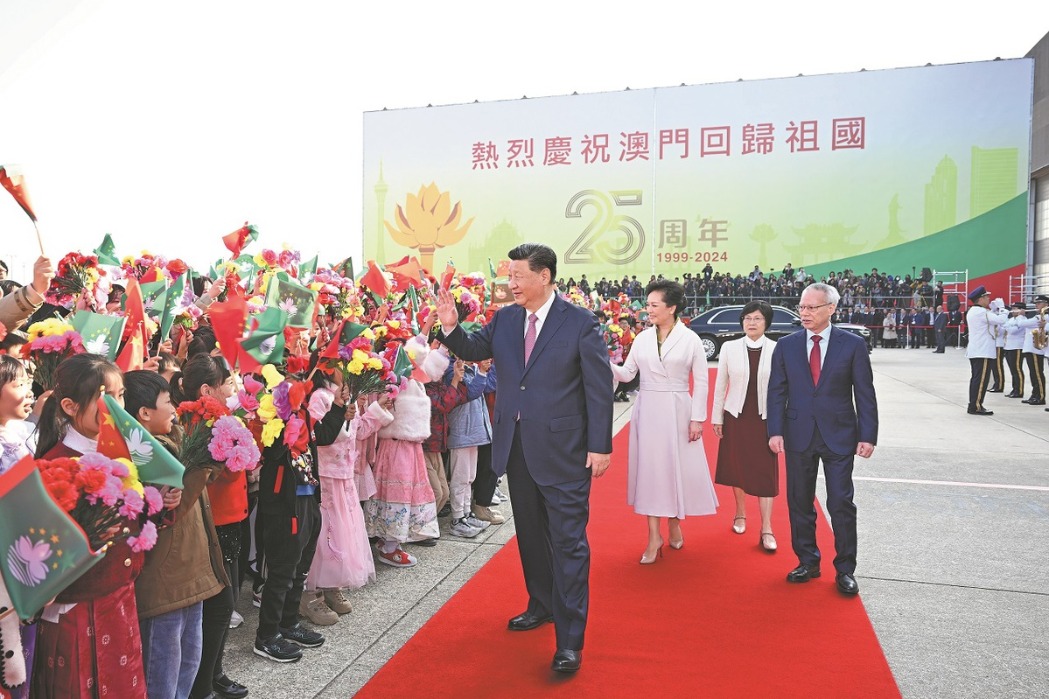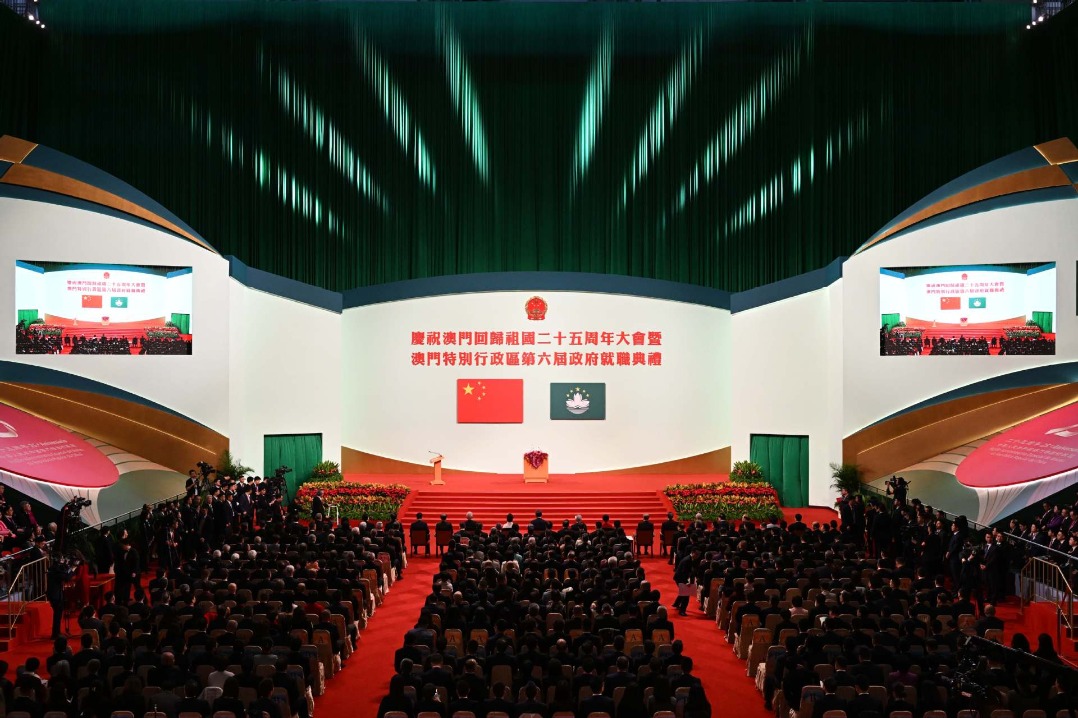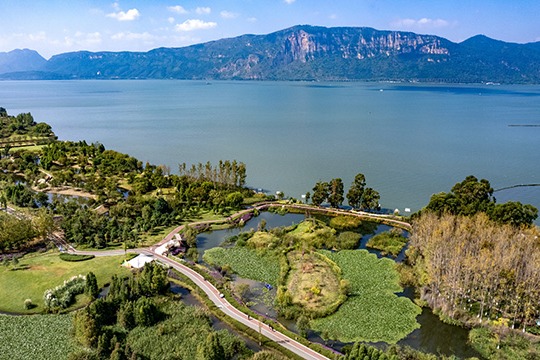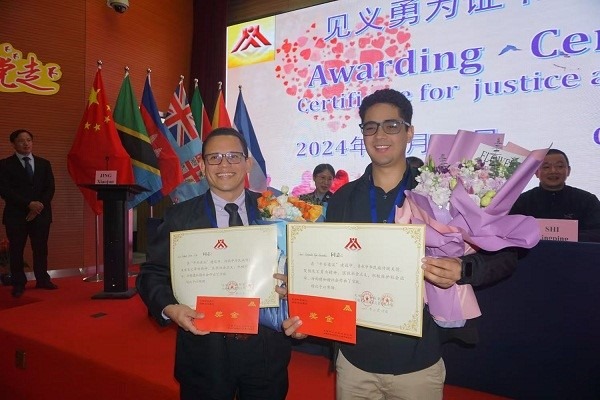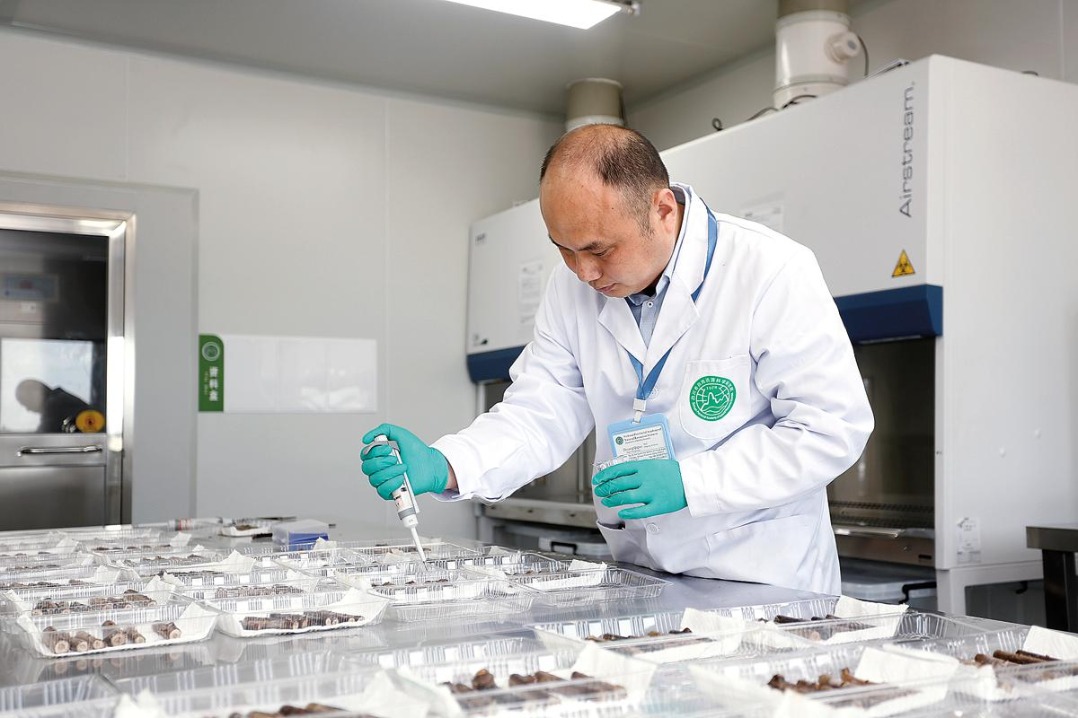China's Epic Journey from Poverty to Prosperity

2. Expanding People's Democracy
By achieving moderate prosperity in all respects, China has better ensured the economic and political rights of its people. The CPC leads the Chinese people on the socialist path of political advancement with Chinese characteristics. It upholds the unity of the Party's leadership, the people's position as masters of the country, and law-based governance, and is committed to developing whole-process people's democracy. Democracy has thus grown from a set of values into a system, a governance mechanism, and a way of life rooted in the land of China. The Chinese people have become true masters of their country, society and future, and enjoy extensive, full and genuine democracy.
The people enjoy broad democratic rights. In China, all power of the state belongs to the people. The people engage in democratic elections, consultation, decision-making, management and oversight in accordance with the law (Panel 3).
Panel 3 Whole-Process People's Democracy
Among the deputies to the 13th National People's Congress (NPC), frontline workers and farmers account for 15.7 percent, and all 56 ethnic groups are represented; in the 13th National Committee of the Chinese People's Political Consultative Conference (CPPCC), non-CPC members account for 60.2 percent.
More and more women are participating in the decision-making and management of state affairs. There are 742 female deputies to the 13th NPC, accounting for 24.9 percent of the total; there are 441 female members in the 13th CPPCC National Committee, representing 20.4 percent of the total.
Since the 18th CPC National Congress in 2012, public opinion has been solicited on draft laws on 187 occasions, and more than 3 million comments from about 1.1 million people have been received, many of which have been adopted. During the drafting of the Civil Code, 10 rounds of public opinion solicitation were conducted, resulting in over 1 million comments from 425,000 people. During online solicitation for the preparation of the 14th Five-year Plan, over 1 million suggestions were received in two weeks. The NPC Standing Committee has established 10 local legislative outreach offices. By June 2021, these outreach offices had conveyed nearly 6,600 pieces of advice on 109 draft laws and legislative plans, many of which had been accepted.
The CPC Central Committee has organized or entrusted relevant departments to organize more than 170 consultative forums since 2012. On these occasions, it engaged in consultation with the other political parties and prominent individuals without party affiliation (non-affiliates) and solicited their opinions on matters of great importance such as the reports to the CPC national congress and plenary sessions of the CPC Central Committee and the formulation of the 14th Five-year Plan. The central committees of the eight non-CPC political parties and the non-affiliates have made more than 730 written proposals, many of which have turned into major state policies. From March 2018-when the First Session of the 13th CPPCC National Committee was held-to June 2021, the CPPCC National Committee received 23,089 proposals.
In the fight against poverty, the CPC Central Committee entrusted central committees of the other eight political parties to monitor the process in eight central and western provinces and autonomous regions that faced onerous work in poverty alleviation. These parties made 36,000 interventions in democratic scrutiny over poverty alleviation actions, offered over 2,400 pieces of written advice to CPC committees and governments of the eight provinces and autonomous regions, and submitted more than 80 reports of various types to the CPC Central Committee and the State Council.
In 2020, China spent RMB2.4 trillion on R&D, ranking second in the world. Its R&D intensity (ratio of R&D to GDP) reached 2.4 percent. A total of 1,345,000 utility patent applications were filed with domestic agencies and 441,000 were granted. In addition, 69,000 international patent applications were submitted through the Patent Cooperation Treaty. China ranked 14th on the Global Innovation Index in 2020 and was the only middle-income economy in the top 30 on this list.
The principles that apply in China's direct and indirect elections are universal suffrage, equal rights, multiple candidates, and secret ballot. All citizens of the PRC who have reached the age of 18-with the exception of those persons deprived of political rights in accordance with the law-h(huán)ave the right to vote and stand for election.
Socialist consultative democracy has experienced broad-based, multilevel and institutionalized development. Through various means and channels, the people are involved in extensive consultations on matters concerning reform, development and stability, especially those related to their vital interests, to reach the broadest convergence on the aspirations and expectations of society as a whole.
In making and implementing major decisions, the Party and the state solicit advice from all sectors of society, take account of public opinion, and pool the wisdom and strength of the people, in order to ensure democratic and sound decision-making.
The people participate extensively and directly in managing social issues, and local residents run their own affairs by serving the community and exercising self-education and public scrutiny.
In accordance with the Constitution and laws, the people have the right to offer criticism and make suggestions regarding any government office or employee. They have the right to level complaints, charges, or accusations against any government office or employee for violations of the law or dereliction of duty.
Democratic elections, consultation, decision-making, management and oversight are closely linked and integrated. There is a unity of democratic processes and democratic results, procedural democracy and substantive democracy, and direct democracy and indirect democracy, and the people's rights to be informed, to participate, to express views, and to supervise the exercise of power are protected.
The Chinese people enjoy extensive democratic rights. They have the best understanding of China's democracy, and they have the final say as to whether it works or not.
The CPC keeps attuned to the situation of the people, understands their needs, addresses their concerns, pools their wisdom, solicits their opinions, and asks for their advice. These are important means for the Party and the government to govern the country. In China, democracy is healthy, the people live in contentment, and society is full of vitality. On various matters including necessities of daily life, transport, health care, education, community management, social governance, state policies and development planning, the people can have their voices heard through democratic channels. Popular and original practices and forms of primary-level democracy continue to emerge, such as democratic discussions, hearings, online political deliberation, remote consultations, local legislative outreach offices, community councils and neighborhood meetings. This represents a general trend whereby matters concerning the core interests of the people are discussed and dealt with by the people themselves, and they make the decisions.
China's democracy ensures that the people have channels to express their expectations, wishes and requests, to have their voices heard, and to receive feedback. This process effectively addresses the problems faced by the people, and conveys the aspirations of the whole of society, so that the whole nation unites as one and works together for common goals.
People's democracy has an institutional guarantee. It mainly includes such systems as people's congresses-which form the fundamental political system of China-CPC-led multiparty cooperation and political consultation, regional ethnic autonomy, and grassroots self-governance. Ensuring the people's principal status as masters of the country, these systems have laid a firm institutional foundation for protecting the people's interests.
The people exercise state power through the NPC and the local people's congresses at all levels, which are responsible to the people and subject to their oversight. State organs are created by people's congresses at each successive level and are responsible to them and subject to their oversight. People's congresses at all levels are constituted through direct or indirect democratic elections. Their responsibility is to faithfully represent the interests and will of the people and to participate in the exercise of state power in accordance with the law.
Multiparty cooperation and political consultation under the leadership of the CPC is a new type of political party system, in which the CPC is the ruling party and the other parties participate in governance. It has realized unity between governance and participation in governance, leadership and cooperation, and consultation and oversight. It ensures that the people's rightful claims are honored through a procedure guaranteeing the people's status as masters of the country.
The system of regional ethnic autonomy guarantees the nation's unity and solidarity, and ensures that all ethnic groups participate in governance. It fully protects the equal rights of all 56 ethnic groups and the power of self-governance in ethnic autonomous areas, underpins development in ethnic minority areas, and reinforces ethnic unity.
The system of grassroots self-governance enables the people to directly exercise democratic rights through multiple channels such as villagers committees and urban residents committees. This improves the effectiveness of community-level governance. The system of democratic management through employees congresses in enterprises and public institutions plays a positive role in protecting the lawful rights and interests of employees. It ensures they run their own affairs, brings vitality to these organizations, and helps them flourish and prosper.
The socialist legal system with Chinese characteristics, with the Constitution at the core, is improving, providing a solid legal guarantee for the people to play their role as masters of the country.
Social equity and justice prevail. The fundamental strategy of governing the country by rule of law has been fully implemented. China has succeeded in coordinating law-based governance, exercise of state power, and government administration, and in integrating rule of law for the country, the government, and society. Reform of the judicial system and mechanisms has advanced. The rule of law plays a greater role in representing the people's interests, reflecting their wishes, protecting their rights and interests, and improving their wellbeing.
Social equity and justice-goals of the rule of law-are manifest in the whole process and every aspect of legislation, law enforcement, judicature, and law observance. The principle that judicial activities must serve the people is applied in full, and judicial credibility has seen a notable improvement. People can see for themselves that China is moving closer to the goal that equity and justice are served in every judicial case.
- Chinese lawmakers hear reports at NPC standing committee session
- Remarkable progress in farmland conservation
- China completes provincial databases to enhance record filing, review
- Audit report shows China fixed 94% of fiscal irregularities
- Fallen crane causes collision on Shanghai metro line
- Death anniversary of Canadian surgeon Norman Bethune commemorated in China
















